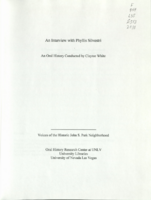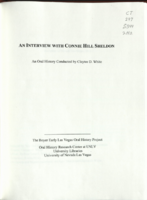Search the Special Collections and Archives Portal
Search Results

Transcript of interview with Bernie and Barbara Kaufman by Barbara Tabach, October 27, 2014
Date
Archival Collection
Description
Bernard ?Bernie? Kaufman and Barbara (Raben) Kaufman were married in 1961 in their childhood home of St. Louis, Missouri, at the ages of twenty-one and nineteen respectively. In 1968, they moved to Las Vegas, joining Bernie?s brother, Herb, in the growing city who had opened the first store. Bernie assisted in managing the family businesses four stores, until they were sold in 1982. At that time, he went into the car rental business; he sold that business in 2000 and then went into airport advertising. Barbara focused herself on raising their children, Carrie and Andrew, and once the children were in their teens, she went to work for her brother as a bookkeeper. In this interview, the Kaufman?s reflect upon their upbringing in St. Louis, where they met and married, and making the decision to move to Las Vegas. They discuss the experience of running the stores and the impact on business as the retail environment changed over the years. The Kaufmans also talk about their involvement with the Jewish community, including B?nai B?rith and Sisterhood, and how it?s grown over the years. They also discuss the impact of the Jewish community members in gaming as well as other sectors, and the increase of congregations over the decades.
Text

Transcript of interview with Jay Poster by Barbara Tabach, August 26, 2016
Date
Archival Collection
Description
Music brought Jay Poster to Las Vegas for a brief time in 1974. Jay wanted to pursue a musical career and his cousin was a professional musician with the Nat Brandwynne Orchestra at Caesars Palace. To Jay?s disappointment, within a few months his cousin Jack Poster left Las Vegas for a road tour. So Jay decided his best strategy was to return home to San Diego and his studies at San Diego State University. It would be over a decade later before Jay returned to Las Vegas to live and this time it became permanent. This time it was not for music. For beyond his musical talent, Jay had a gift for connecting with people of all of ages and walks of life. He was good at sales and his day job selling office furniture offered him the opportunity to transfer to Las Vegas in 1986. Within a few years, however, it was a recruiter for Palm Mortuaries who introduced Jay to his defining career moment and to Allen Brewster, a prominent Jewish leader and founder of King David Cemetery and Mortuary. It was 2001. Jay has been King David?s ever since and is the General Manager. In this interview, Jay describes his personal and spiritual growth through his career in funeral services and his respect for the Jewish traditions of burial and grieving. In addition, his passion for music has also soared and he talks about his participation in the Shabbatones at Congregation Ner Tamid and Desert Winds, a community based performance organization. He shares his love of traditional Jewish klezmer music and the Meshugginah Klezmorim.
Text

Transcript of interview with Michael Saltman by Barbara Tabach, December 16, 2014
Date
Archival Collection
Description
In this interview, Michael Saltman recounts his family background, his schooling in Michigan, and living abroad in London and Munich. His travels to Israel in 1968 reinforced his connection to Judaism. Saltman and his wife, Sonja, moved to Las Vegas in 1975 and he began working with Larry Larkin, who eventually became his partner. He discusses several projects he completed with Larkin, including shopping centers and apartment complexes. He talks about the changes in Las Vegas that came about from the availability of financing from legitimate sources, and the population growth of the area. He then talks about his involvement in the local Jewish community with the Jewish Federation, Anti-Defamation League and Congregation Ner Tamid.
In 1942, Michael Saltman, the son of a rugged Canadian entrepreneur and of an educator, was born in Flint, Michigan. Michael spent a fulfilling childhood in Flint, where his family was involved in the Jewish community, even helping start a new temple. However, his life changed dramatically when his father passed away during his teenage years. At his mother's insistence, Michael went to law school after graduating from Michigan State University, and received his Juris doctor from Wayne State University. From Detroit, Michael headed to London to participate in an LL.M. program, though he quickly withdrew and landed a position with a life insurance and investment company in London. Michael soon relocated to the company's Geneva office, where his job included establishing operations in Israel. It was during these trips that he more intensely connected with Judaism and his Jewish identity. Michael left the company to join a former colleague at Shareholders Capital Corporation, where he met his wife Sonja. The couple moved to Munich, where they lived until 1975, until moving to Las Vegas. In Las Vegas, Michael became a successful real estate developer. His projects include apartments, shopping centers and office parks, like Village Apartments, Campus Village Shopping Center and Renaissance Center. He later opened Food 4 Less grocery stores in Nevada, Utah and California, eventually buying the Kansas-based company from Lou Falley. He and his partner later sold the company to Kroger. Michael served on the local Jewish Federation's board of directors, and Sonja is a longtime board member for the Anti-Defamation League's regional office in Las Vegas. In 2003, Michael and Sonja co-founded the Saltman Center for Conflict Resolution within William S. Boyd School of Law. Michael's other efforts to promote peaceful conflict resolution include the production of Streetball Hafla, a movie shot in Israel about Jewish and Palestinian teenagers interacting in basketball camp.
Text

Transcript of interview with Shawn Willis by Barbara Tabach, May 5, 2017
Date
Archival Collection
Description
Shawn Willis (1972 - ) grew up in a culturally diverse area outside of Detroit, Michigan. She has made Las Vegas her home since 2004. Since moving to Nevada, she ?acknowledged? her Judaism and built a robust network within the Jewish community as an entrepreneur and tireless leader. From 2015 ? 2017, she held the position of Director of the Jewish National Fund of Las Vegas. The Jewish National Fund is a worldwide organization that was founded in 1901 to meet the strategic challenges of building in Israel and developing the infrastructure for ecology, special needs and heritage preservation. Among the local initiatives that Shawn led was a program on water conservation. In this oral history, Shawn candidly speaks of being a convert to Judaism. She also shares how she introduced herself into the Las Vegas community in a vibrant way through her marketing expertise and business. Shawn currently serves on the UNLV Foundation?s President?s Associates Council and is an active person in the Las Vegas community. Shawn is a graduate of University of Detroit Mercy.
Text

Transcript of interview with Karen Hayes by Robert F. Darling, March 2, 1980
Date
Archival Collection
Description
On March 2, 1980, collector Robert F. Darling interviewed state assemblywoman, Karen Hayes (born October 16th, 1935 in Cedar City, Utah) in her home in Las Vegas, Nevada. This interview covers her personal history, the history of Las Vegas, and the local political environment. The gaming industry is also discussed, in addition to the Sagebrush rebellion and future local political projections and trends.
Text

Transcript of interview with Leander Fields Hayes by Mark Kevin Ryhlick, March 13, 1981
Date
Archival Collection
Description
On March 13, 1981, collector Mark Kevin Ryhlick interviewed local technician, Leeander Fields Hayes (born on May 23rd, 1907 in Salt Lake City, Utah) in his home in Las Vegas, Nevada. This interview covers the history of entertainment in Las Vegas from the mid-forties to 1958. Brother Hayes, as he requests the collector to call him, specifically covers the local live music and comedy scenes. He also touches on the topic of segregation and how Black entertainers, such as Lena Horne, were treated when they came to perform in Las Vegas, Nevada.
Text

Transcript of interview with Mary Habbart by David Patt, March 7, 1975
Date
Archival Collection
Description
On March 7, 1975, collector David R. Patt interviewed dairy and vegetable farm owner, Mary Habbart (born January 1st, 1719 in Boothwyn, Pennsylvania) in her home in Las Vegas, Nevada. This interview offers an overview of life in Las Vegas in the early days, which included: atomic testing, floods, prostitution on Block 16, early Fremont Street and Duck Creek. Also discussed during this interview: Sunset Park, The Roosevelts, Bugsy Siegel, local government and the Hoover Dam.
Text

Transcript of interview with Phyllis Silvestri by Claytee White, January 11, 2010
Date
Archival Collection
Description
As a young woman, Phyllis Silvestri made the adventurous decision to move to the United States. She was bom in Canada and lived there until her early 20s. Over the next few years, Phyllis and her friend Mona logged many miles, worked and visited several states. By 1953, Phyllis had met and married Vincent Silvestri, who worked at Bingo Palace, now the Sahara Hotel and Casino. Soon they had their first child and had bought a home on Santa Rosa. A few years later they were building a new home in the John S. Park area. She proudly recalls her husband's attention to details such as including lots of built-in features and a bomb shelter that represents the era. Phyllis talks fondly of the neighborhood, but also recalls her children not being allowed to play with some of the neighborhood children because they were of Italian ancestry.
Text

Transcript of interview with Connie Hill Sheldon by Claytee White, February 11, 2013
Date
Archival Collection
Description
Connie Hill Sheldon and her identical twin, Billie, also were members of Rancho High School 's first graduating class of 1962. Connie and Billie were born in 1944 in Oklahoma and spent their early years in southern California before moving to Las Vegas in 1956 with their mother, brother, and stepfather, Gerald Elmore. In Las Vegas Connie and her siblings attended Sunrise Acres Elementary School before going to Rancho, and the family was active with Homesite Baptist Church. While she was at Rancho Connie worked at the Huntridge Theater, and she continued working there after she graduated. In 1968 Connie married fellow Rancho '62 classmate Clyde Sheldon in Goldfield, Nevada. At the time of their marriage Clyde was an active-duty Marine. Over the course of his twenty-year USMC career the Sheldons lived in several places, but following his 1983 retirement they returned to Las Vegas and then moved to Pahrump. In this interview Connie particularly focuses on military life in New Yo
Text

Interview with Nick C. Aquilina, June 25, 2004
Date
Archival Collection
Description
Text
